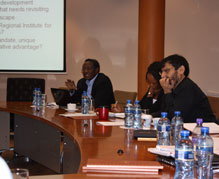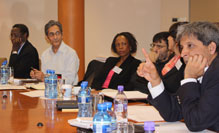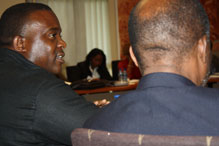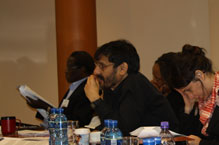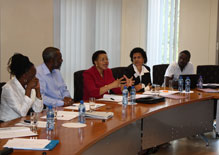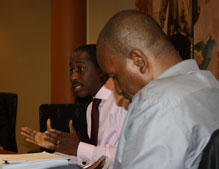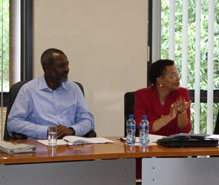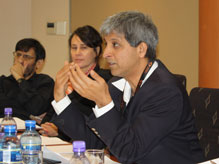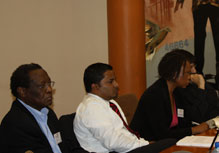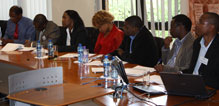
The Nelson Mandela Foundation hosted a workshop organised by Graça Machel and Dr Nkosana Moyo
November 10, 2009 – There is a need to set up a regional institute for development studies which gathers, creates and disseminates knowledge with a view to influencing policy makers in order to meet Africa’s development challenges.
This was the conclusion of a workshop hosted by the Nelson Mandela Foundation yesterday at the Foundation offices in Houghton.
Organised by Graça Machel and Dr Nkosana Moyo (vice-president of the African Development Bank in Tunisia, or the AfDB), the workshop was attended by academics and development institutions from around the world. It was a brainstorming session to debate the feasibility and desirability of creating an institute whose primary mandate would be to address development challenges facing Africa in a more comprehensive way.
Opening the workshop, Foundation CEO Achmat Dangor said there was a gap between knowledge and the practice of development in South Africa.
Machel agreed but added: “I think we haven’t always asked the right questions.
“Despite the millions of initiatives that have been set up to address the challenges facing the continent, it looks like we are not winning,” said Machel. “This is an opportunity to address the question: are we doing the right thing? The kind of institution we have in mind is an institution that can ask questions of any kind. We hope to create a space of debate and questioning of the different kinds of approaches and thinking.
“I am hoping that at the end of today we will have developed common ground and a common space where our minds meet and then the question will be: where to next?”
Further explaining the reasoning behind the workshop, Dr Moyo said that while he was not a social scientist, as an African he was presented with evidence every day that development efforts were not succeeding.
He asked whether the foundations for development agencies’ efforts were in place.
“You can interfere with the laws of nature successfully only if you understand the laws of nature,” said Dr Moyo. “So with social development I am looking for the foundation stones. Why is it that so much effort has left us with so few results?”
Moyo introduced political author Bhekinkosi Moyo, who presented the discussion points for the workshop.
Moyo highlighted gaps with the current status quo in development work, and the need to think differently for different development results.
He argued that the proposed institute would need to play a strong collaborative role, while attracting funding from the continent.
“Risks,” said Moyo, “would be issues such as duplication of roles with other organisations, finding dedicated and well-trained staff, and the feasibility of sustained funding.” He concluded that there was a general acceptance of the need for such an institution.
Summing up Moyo’s presentation, Dr Moyo highlighted the discussion areas as: What is missing with development efforts so far? If something is missing, does it justify the formation of a new and different institution? Can the need not be met by an existing institution?
In the discussion that followed, a number of areas were highlighted as missing components that hindered development work.
These included: a lack of economic investment in Africa by Africa and Africans; a lack of ownership and accountability by underdeveloped communities; and the external influence from other countries on African policy makers.
Much of the morning session’s debate centred on whether there is a need for an organisation set up to think about the long-term development of Africa without having to produce a steady stream of short-term results.
Professor Thandika Mkandawire from the London School of Economics said that there was a lack of institutions in Africa that were spaces of reflection where people could think about issues that pertained to Africa.
“The view that Africa should only be thinking short term is an insult to Africans,” said Mkandawire.
It was a hotly debated point, with Dr Moyo arguing that no one would be interested in funding an institution “where people could dream”.
Tendai Murisa from the African Institute for Agrarian Studies, however, said that pressure to produce results undermined development efforts. The proposed institute, he argued, would need to be given time to produce results. “Otherwise,” he said, “we’ll have another institution based on excellent research that fails to do anything.”
Professor Adam Habib, deputy vice-chancellor at the University of Johannesburg, argued that the need for the type of institution that Mkandawire had proposed didn’t mean that there was no need for institutions that did provide short-term results.
Professor Steven Friedman (director of the Centre for the Study of Democracy Rhodes University/University of Johannesburg), following on from Murisa’s point, argued that at the moment “we are only interested in producing reports that look like we’re doing something, that are not well thought out and not well researched”. Without an institution such as the one Mkandawire proposed, continued Friedman, we would not successfully address development issues in Africa.
Another key theme in the morning’s discussion was the notion that development challenges in Africa are primarily political, rather than economic, and there was a strong need to have policies and systems in place to empower and facilitate development work in Africa.
Pascal Dozie, chairman of the Nigerian Economic Summit Group, said the main issue was leadership. If we resolve the leadership problem, he argued, we will resolve the development issues. The question, Dozie argued, was: “Do we have an institute that can help us develop the leadership that is required?”
Debate around how to ensure effective leadership in Africa wrapped up the morning session.
Coming out of the morning’s discussion was the acknowledgement that there were definite spaces in which an institute could operate. The important thing, said Mkandawire, was that the institute should not be expected to do everything, but would be part of a systemic approach to developing the region.
The afternoon session focused on what the proposed institute for development studies would do if it came into existence.
The aim of the afternoon session, said Dr Moyo, was “to focus on the niche and mandate”. It was important to know not only what the organisation would do, but how it would do it.
Participants discussed various roles for the proposed organisation, from funding projects being explored by existing institutes to being an authoritative organisation which researches development issues Africa, consults with policy makers, and has a long-term vision for the continent.
The consensus answer to the question of what is missing was that there is a lack of knowledge and a need for an institute that collects and creates relevant knowledge about Africa. The institute could produce, collect and disseminate knowledge from the platform of dialogue.
It was also important, argued the Foundation’s Dialogue Programme Head, Mothomang Diaho, that the information from the institution was seen as legitimate. In order for the institute to have any efficacy, she argued, its credibility was critical.
Wrapping up the day’s discussion, Dr Moyo said that he felt that the group had developed a good starting platform for further debate. Machel thanked the participants for their contributions.
“I hope we will continue to engage with one another,” she said.
